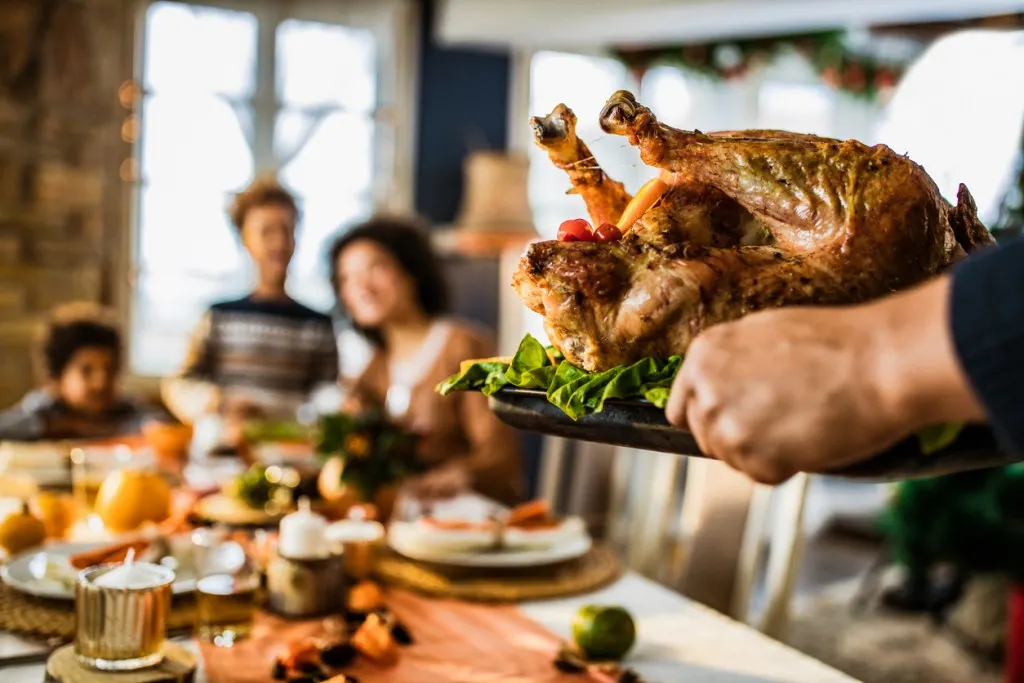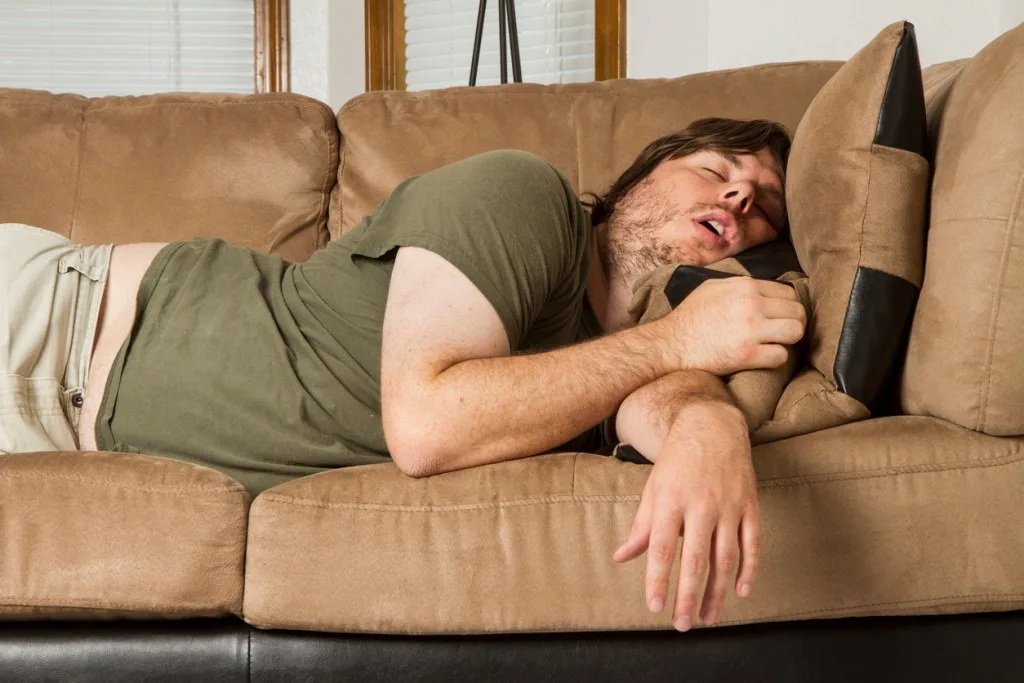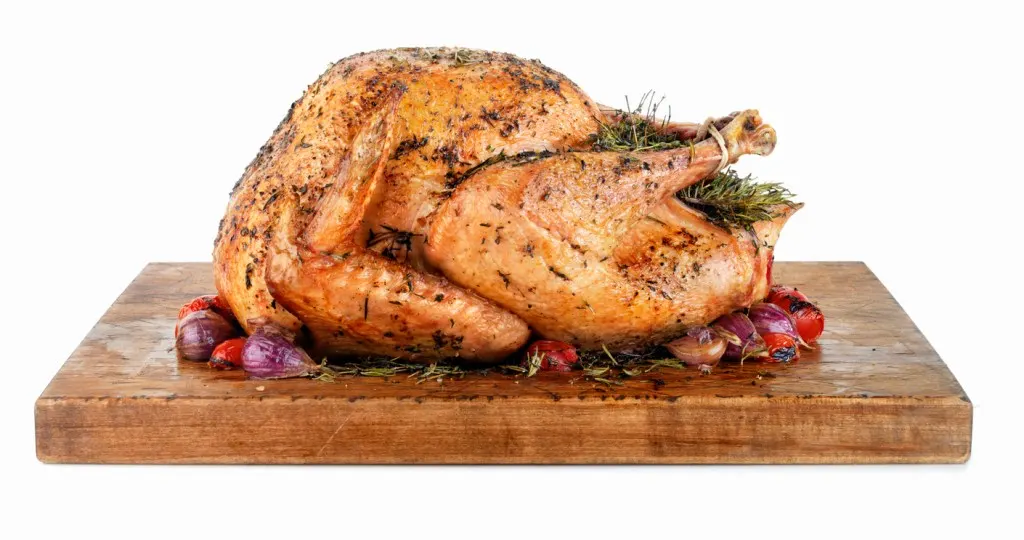We’ve all gotten sleepy after a turkey dinner. For some people, falling asleep on the couch after a giant holiday meal is just as big a tradition as giving thanks, exchanging gifts, and spending time with loved ones.
But does it surprise you to hear that turkey might not be the culprit behind your sudden drop in energy? Researchers have studied this issue at length, and this delicious bird is probably last on the list of things sapping your strength.
So what is behind this festive fatigue? We dug in to find the causes.
Let’s go!
What’s Behind the Idea That Turkey Makes You Sleepy?
Turkey has a reputation for making people sleepy. But science begs to differ. Turkey does contain tryptophan, an essential amino acid that helps produce the hormones responsible for sleepiness. However, it isn’t causing your post-holiday meal naps.
This myth likely came about thanks to turkey’s popularity during the holidays. After all, it’s standard fare for people who celebrate Thanksgiving and Christmas. But it isn’t the bird making you sleepy. It’s the bird and everything else on the table!
Research tells us that high-fat, high-carb meals cause fatigue. Most traditional holiday foods fit into one of those two categories. If you’re sampling an entire holiday spread, turkey is only one small piece of the puzzle.
Does Turkey Really Have Enough Tryptophan to Make You Sleepy?
Turkey is an excellent source of this essential amino acid. Tryptophan isn’t just responsible for producing melatonin, the hormone that causes fatigue. It’s also involved in the production of serotonin, a hormone that plays a critical role in good mood and contentedness.
Every person needs tryptophan in their diet. Some folks even have natural deficiencies and take it in supplement form. Adults who rely on these supplements take about five grams daily to assist with sleep. Those without within the typical range should consume about 425 milligrams daily.

By contrast, two servings of turkey contain a total of 410 milligrams of tryptophan. Although that’s a good amount, it doesn’t even exceed the daily recommended value! Think of it this way: someone with a deficiency would have to eat almost 20 servings of this bird to get their five grams. That’s a lot of turkey!
Here’s another fun fact. Tons of other foods are also excellent sources of this amino acid. Chicken and fish contain tryptophan, as do eggs, cheese, seeds, and legumes. Despite this, turkey is the only food with a reputation for inducing naps.
So what exactly is it that’s making us so sleepy after those holiday feasts?
Why Are You So Sleepy After a Holiday Meal?
As it turns out, holidays are tailor-made for zapping your energy. So many factors contribute to the sleepy feeling that follows a turkey dinner.
Overeating generally causes fatigue. High-carb, high-fat foods in large quantities are a literal recipe for sleepiness. This effect typically hits about 1.5 hours after a meal but can occur sooner. And because many of these foods also have a high glycemic index, they actually cause you to fall asleep more quickly than usual.

Enjoying an alcoholic beverage with your holiday meal will heighten this effect. Alcohol is a depressant that slows your brain’s processing power and dampens your nervous system. Adding booze to this equation will only make your energy drop further. (Drinking excessively can also disrupt your sleep patterns and cause fatigue the following day.)
Food aside, other elements may be draining you during the winter months. Seasonal Affective Disorder (SAD) is a form of depression caused by low seasonal light. One common feature of depression is a reduced energy level. Interestingly, SAD can also cause cravings for those high-glycemic-index foods.
But there’s an even simpler possibility. Your post-meal naps could be the result of a scheduling conflict between your body’s internal clock and your holiday celebrations. Most people’s circadian rhythms call for rest about 12 hours after the peak of their nighttime sleep.
This time frequently falls during or just after lunch hours, and your heavy Thanksgiving feast may send your fatigue into overdrive.
Are There Ways to Avoid Feeling so Sleepy After a Turkey Dinner?
Comforting, traditional foods are a priceless part of the holiday experience. Follow these simple guidelines, and you’ll never need to give up your turkey dinner.
During the holiday season, make sure you get plenty of sleep. Large family gatherings and seasonal celebrations are sure to disrupt your everyday routine. But if you get a good night’s sleep, your body will thank you later. Shoot for at least seven hours of sleep per night.
Trying to eat smaller portions at your next Thanksgiving dinner will also pay off in the long run. Smaller servings will give your body enough time to digest rich, high-glycemic-index foods. When possible, try to limit starchy foods. Avoiding excess carbs will do wonders for your energy levels.
Aiming for moderate alcohol consumption is another way to ensure you won’t become over-tired. If you’re going to drink, limit your servings and avoid intoxication. Moderation will ensure that your sleep cycles aren’t affected. Eliminating alcohol is your best bet for an energy boost.
Finally, try something counterintuitive, exercise! Working out is fantastic for your overall health, and physical activity aids in healthy sleep habits. Make sure not to exercise within three hours of your bedtime for the best results.

Food Coma Fables
Despite its infamous reputation, turkey won’t make you sleepy. This delicious bird is no likelier to make you fall asleep on the couch than a hefty serving of cheese. If you’re concerned about making it through the holidays without a nap, focus on self-care.
Eating and drinking in moderation, getting plenty of sleep, and paying attention to your mental health will play a much more significant role in your energy levels.
Discover the Best Free Camping Across the USA
To be honest with you, we hate paying for camping. There are so many free campsites in America (with complete privacy).
You should give it a try!
As a matter of fact, these free campsites are yours. Every time you pay federal taxes, you’re contributing to these lands.
Become a FREE CAMPING INSIDER and join the 100,000 campers who love to score the best site!
We’ll send you the 50 Best Free Campsites in the USA (one per state). Access the list by submitting your email below: